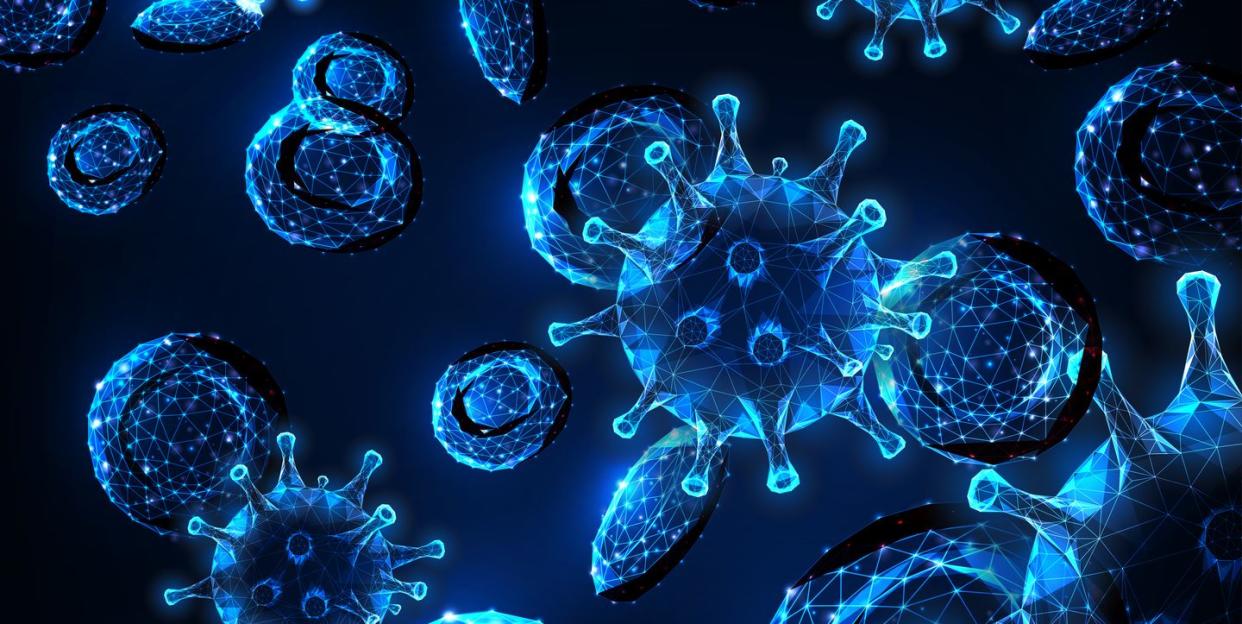New Study Suggests COVID-19 Immunity Lasts Much Longer Than Experts First Thought

As novel coronavirus cases continue to surge in the U.S., the national conversation has shifted to address that plenty of people have and will get sick with COVID-19, the respiratory illness caused by SARS-CoV-2. For many, that’s led to one big question: Can you get infected twice?
There have been confirmed cases of reinfection in Hong Kong, Belgium, the Netherlands, and Ecuador. The Centers for Disease Control and Prevention (CDC) states that “cases of reinfection with COVID-19 have been reported, but remain rare” in the United States.
In October, a case report published in the Lancet Infectious Disease Journal detailed the story of a 25-year old Nevada man who was diagnosed with COVID-19 and recovered relatively quickly. About a month later, he developed a more severe case and landed in the ER with trouble breathing. He has since recovered, and was only the fifth confirmed case of reinfection in the world.
What does COVID-19 reinfection mean?
Reinfection means a person was infected with the virus once, recovered, and went on to be infected again. “Based on what we know from similar viruses, some reinfections are expected,” the CDC says.

Reinfection is common with other coronaviruses, like the ones that cause the common cold, but “they often occur after a year or so,” of being ill, says infectious disease expert Amesh A. Adalja, M.D., senior scholar at the Johns Hopkins Center for Health Security. “They don’t usually cause severe disease.” He emphasizes that COVID-19 reinfection “has only happened a handful of times.”
Many experts believe that cases in which patients test positive for the second time could also be due to testing errors, explains Richard Watkins, M.D., infectious disease physician and professor of internal medicine at the Northeast Ohio Medical University. This could include false positives and negatives due to contaminated samples, human errors, or overly sensitive tests.
So, how long does COVID-19 immunity last?
This is an evolving area of research. First, it’s important to recap antibodies and their role in immunity. Antibodies are proteins produced by your white blood cells to fight off infection-causing pathogens, including bacteria and viruses, according to the Food and Drug Administration (FDA). They can also help prevent future infections from those same pathogens, including SARS-CoV-2.
Once infected with the coronavirus, nearly everyone with a normally-functioning immune system will develop IgM and IgG antibodies, which can take days to weeks to develop in the body after you have been exposed. While the FDA says it’s “unclear” how long COVID-19 immunity lasts, a new study has some hopeful insight.
The study, which has not yet been peer reviewed or published in a scientific journal, analyzed antibodies in 185 COVID-19 cases. “We found that the body’s immune system remembers the novel coronavirus for at least eight months, which suggests to us that the immune system can remember the virus for years,” says study co-author Shane Crotty, Ph.D., a professor in the Center for Infectious Disease and Vaccine Research at La Jolla Institute for Immunology. “Most likely, many people will be protected from a repeat case of COVID-19 for substantial time.”
The study also found some variation in immunity among the participants. “Most people had a measurable robust immune memory but a few individuals did not,” says study co-author Alessandro Sette, Dr.Biol.Sci., a professor in the Center for Infectious Disease and Vaccine Research at La Jolla Institute for Immunology. “We don’t know for sure yet but it is possible that at least some with particularly low immune memory could be susceptible to reinfection.”
It’s unclear, though, why a select few people may wind up with COVID-19 twice. “We don’t know if they just didn’t develop a good immune response beforehand or if they have some sort of genetic nuance that make them more susceptible,” says Thomas Russo, M.D., professor of medicine and chief of infectious disease at the University at Buffalo in New York.
Bottom line: It’s possible to get COVID-19 twice, but it seems to be very rare.
“Right now, this is exceedingly rare,” Dr. Adjala says, who emphasizes that immunity is a spectrum. “It’s not that you have full or no immunity—it’s usually somewhere in between,” he says. “People could develop immunity from severe infection or needing to be hospitalized.”
It’s also important to remember that COVID-19 is caused by a newly discovered coronavirus and there’s still a lot that experts don’t know about it. “With COVID-19, there are still a lot of blank pages and things we’re learning about,” says William Schaffner, M.D., an infectious disease specialist and professor at the Vanderbilt University School of Medicine. That includes COVID-19 symptoms, side effects, treatments, and how it responds to a vaccine.
That’s why you should try to avoid being infected in the first place—or being reinfected if you’ve already been sick, as researchers are still studying how the virus behaves and evolves. “Wear a mask, wash your hands, and do your best to practice social distancing,” Dr. Russo says. “That works.”
Support from readers like you helps us do our best work. Go here to join Prevention Premium (our best value, all-access plan), subscribe to the magazine, or get digital-only access.
You Might Also Like

